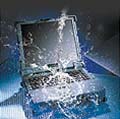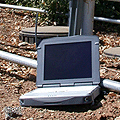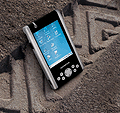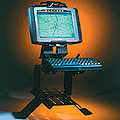|
Advantech AIMB-501
microATX industrial-grade motherboard offers wide range of high-performance Intel processor choices and excellent I/O flexibility for embedded applications
(by Conrad H. Blickenstorfer)
Here at RuggedPCReview.com we generally deal with mobile computer technology, and large motherboards with big CPU fans are not generally on our review agenda. On the other hand, the term "rugged" does apply to industrial-grade boards made by Advantech and a number of other embedded systems manufacturers. While such boards may look like what you can get at your local electronics store, they are significantly tougher and far more configurable. That's because most such boards are used for projects where complete reliability and minimal maintenance requirements matter.
As is, the AIMB-501 is a microATX industrial motherboard. ATX stands for "Advanced Technology Extended" and was introduced in 1995 by Intel, and microATX is a somewhat more compact version of the standard for applications that do not require the several expansion card slots that full ATX boards have. So microATX measures 9.6 x 9.6 inches (vs. 12 x 9.6 inches for ATX) but is otherwise fully compatible with the bigger ATX boards, down to mounting points and power connectors.
Why use an ATX or microATX board when substantial computing power is available on much smaller boards? Because many embedded systems projects require the standard connectors, great configurability, and desktop-class computing power that larger boards deliver more easily and often
Below is what the Advantech AIMB-780 ATX motherboard looks like, complete with processor and processor fan, both from above and looking at the external I/O block:
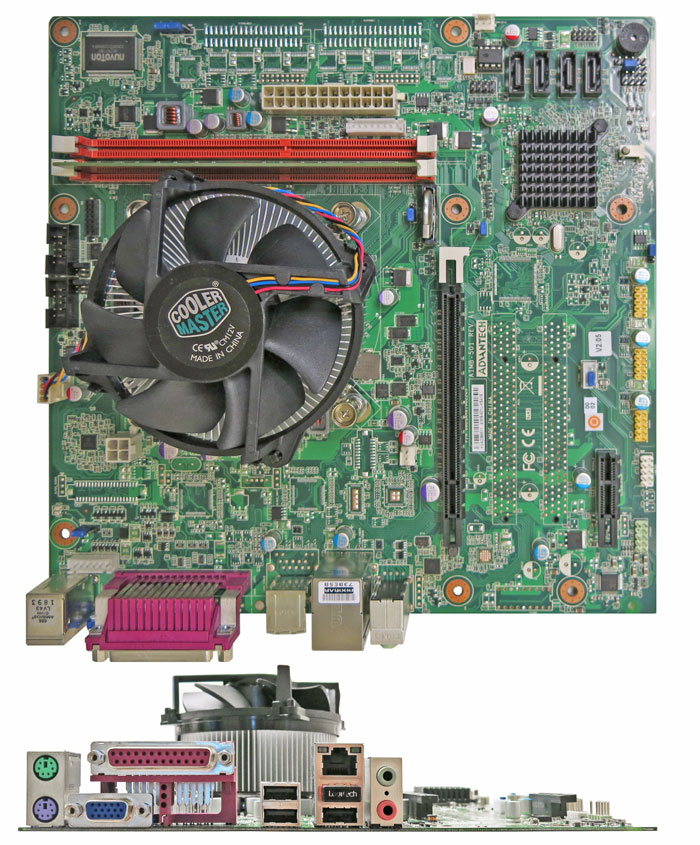
The AIMB-501 covers a very wide performance range by providing a choice of no fewer than eight Intel processors from the 32nm Sandy Bridge and the 22nm Ivy Bridge families. From each family, there's a choice of an i3, an i5 and an i7 processor, which Intel generally considers "good," "better," and "best." If cost matters, there are also Pentium and Celeron choices, with those chips being somewhat detuned version of a Core i3. The following processors are available, all carrying the "Embedded" designation:
- Core i7-3770 (3rd gen, 4 cores, 8 threads, 3.4/3.9GHz, 8MB smart cache, 77 watts)
- Core i5-3550S (3rd gen, 4 cores, 4 threads, 3.0/3.7GHz, 6MB smart cache, 65 watts)
- Core i3-3220 (3rd gen, 2 cores, 4 threads, 3.3GHz, 3MB smart cache, 55 watts)
- Core i7-2600 (2nd gen, 4 cores, 8 threads, 3.4/3.8GHz, 8MB smart cache, 95 watts)
- Core i5-2400 (2nd gen, 4 cores, 4 threads, 3.1/3.4GHz, 6MB smart cache, 95 watts)
- Core i3-2120 (2nd gen, 2 cores, 4 threads, 3.3GHz, 3MB smart cache, 65 watts)
- Pentium G850 (2nd gen, 2 cores, 2 threads, 2.9GHz, 3MB smart cache, 65 watts)
- Celeron G540 (2nd gen, 2 cores, 2 threads, 2.5GHz, 2MB smart cache, 65 watts)
With such a gamut of chips, it's imperative to study what each has to offer and which will be the best match for a given project. Check this link for a side-by-side full comparison of all eigth Intel processors for the AIMB-501.
|
PERFORMANCE COMPARISON
|
Advantech
|
Advantech
|
|
Model
|
AIMB-501
|
SOM-6765
|
|
Type
|
MicroATX
|
COM Express
|
|
Processor Type
|
Intel Core
|
Intel Atom
|
|
Processor Model
|
i5-3550S
|
D2700
|
|
CPU Speed
|
3.30Hz
|
2.13Hz
|
|
Thermal Design Power (TDP)
|
65 watts
|
10 watts
|
|
CPU Mark
|
4,734.2
|
631.9
|
|
2D Graphics Mark
|
473.5
|
48.0
|
|
Memory Mark
|
965.1
|
292.6
|
|
Disk Mark
|
1,161.7
|
849.7
|
|
3D Graphics Mark
|
263.8
|
95.2
|
|
Overall PassMark
|
1,782.2
|
411.4
|
|
ALU
|
75,391
|
14,235
|
|
FPU
|
63,139
|
10,567
|
|
MEM
|
32,993
|
8,842
|
|
HDD
|
32,448
|
13,383
|
|
GDI
|
14,392
|
2,157
|
|
D2D
|
2,667
|
824
|
|
OGL
|
7,721
|
9,632
|
|
Overall CrystalMark
|
228,751
|
59,640
|
Our review board came with an Intel Core i5-3550S and ran Windows Embedded Standard 7 on 2GB of RAM and an 8GB Advantech SQFlash drive for storage. We ran our standard benchmark suites to get an idea of where this board fits in. Passmark Software's PerformanceTest 6.1 runs about 30 tests covering CPU, 2D graphics, 3D graphics, memory, and disk and then computes scores for each category and an overall PassMark score. We used our second benchmark suite, CrystalMark, for confirmation and additional information. For comparison, we're listing the benchmark results of one of Advantech's recent Intel Atom-based COM-Express boards, the SOM-6765.
Even a perfunctory look at the benchmark results shows that our AIMB-501 test board packed a massive punch. The bottom line for both benchmark suites shows roughly quadruple the performance of the Atom-based SOM-6765 board, and that one is no slouch, performing better than most Intel Atom-based devices. In fact, none of the mobile tablet and notebook computers in our benchmark database came close to what this board can deliver in terms of raw performance. That's because there's simply still a large performance gap between mobile systems that must conserve battery power, and desktop systems where essentially unlimited power is available. As is, even the most frugal of the processors available for the AIMB-501 draws a good ten times as much power as even a high end Atom chip such as the D2700 in the SOM-6765 in the comparison chart.
As far as graphics performance goes, this may or may not be an issue for systems using the AIMB-501 board. For server-oriented applications, graphics usually don't matter much, but other applications may require either the fairly powerful Intel HD graphics integrated into all of the available CPUs, or include an add-on high-performance graphics card via the board's PCIe x16 expansion slot. Up to a gigabyte of main system memory can be shared for graphics, and dual displays are supported via various combinations of the board's VGA (two of them), LVDS and DVI ports.
The board offers dual 10/100/1000Base-T gigabit Ethernet, and there are either one or two RJ45 jacks on the rear I/O panel. For disks and other drives, the board offers four 300 MB/s SATA II channels. Unlike many of the smaller form factor Advantech boards, the 780 doesn't have a CF Card slot.
Advantech actually offers two versions of the AIMB-501, with the 501G2 offering a good deal more interface functionality than the spartan 501L version we tested. So those interested again need to study what's available on each version of the board, and if that's enough for their project.
While most of the functionality is pretty much ATX standard, the AIMB-501 offers industrial features such as long product life, reliable operation under a wide temperature range, watchdog timer, USB power can be switched between +5 and -5 Volts, the 501G2 version has no fewer than ten serial ports, some of which support RS232/422/485 and auto flow control, and there's an SMBUS connector that can be configured to I2C.
Anyone who has ever built their own PC from parts knows about the system panel connector that interacts with buttons and lights on the case or enclosure. It connects to the system power LED, reset button, power button, and hard disk activity light. That's no different on an industrial microATX board. Drivers on the supplied disk support standard and embedded versions of Windows XP and Windows 7. The board comes with SUSIAccess Pro 2.0 that enables remote device management and monitoring as well as protection features, system recovery, and diagnostics.
The BIOS offers an unusual usual wealth of setup options, both the basic settings and the arcane fine-tuning that can make all the difference between a secure, optimized system and one that tends to act up. And here is a diagram of how it all fits together:
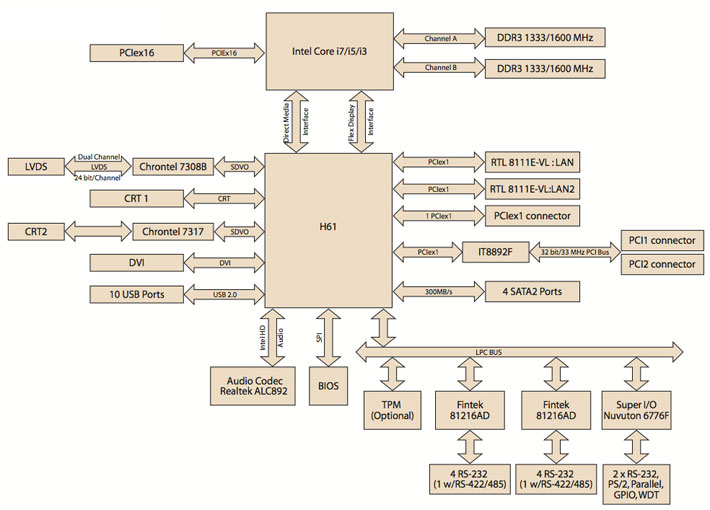
Here is what Advantech ships when you buy the AIMB-501 for your project:
- AIMB-501 microATX Main board
- Driver CD
- Startup manual
- two SATA HDD cables
- COM port cable kit
- I/O port bracket
Overall, the Advantech AIMB-501 is impressive. Board layout is neat and clean and well organized. Soldering is clean and perfect, nothing is loose, and there wasn't a single jumper wire "fix." Add to that the variety of supported processors and the two different I/O versions, and the AIMB-501 represents a very solid and highly configurable foundation for many high-performance industrial and embedded computing projects.
-- Conrad H. Blickenstorfer, May 2013
Advantech AIMB-501 specs:
| Status |
Added 05/2013
|
| Type |
Industrial-grade MicroATX Motherboard
|
| CPU Type |
Intel Celeron, Pentium, Core i3/i5/i7 (all LGA 1155 socket)
|
| Chipset |
Intel H61
|
| BIOS |
AMI EFI 64 Mbit SPI
|
| Memory |
Max 16GB Dual Channel DDR3 1333/1600 in two 240-pin DIMM sockets |
| Graphics Controller |
Intel HD Graphics (level depends on CPU)
|
| VRAM |
1 GB maximum shared memory with 2 GB and above system memory installed |
| CRT |
2 (CRT1 supports up to 2048 x 1536, CRT2 (optional) supports up to 1920 x 1200)
|
| DVI |
1 (optional, supports up to 1920 x 1200)
|
| LVDS |
1 (supports up to 1600 x 1200)
|
| Dual display |
Yes (CRT1 + LVDS, CRT1 + DVI, CRT1 + CRT2)
|
| LAN |
Yes, (RealTEK 8111E-VL; either 1 or 2) |
| SATA |
Yes, 4 SATA II (300 MB/s) |
| IDE/EIDE |
NA
|
| SSD |
Optional
|
| Expansion: PCI |
Optional, 2 (32-bit/33MHz)
|
| Expansion: PCIe x1 (Gen2) |
Yes, 1 (500 MB/s per direction)
|
| Expansion: PCIe x16 (Gen3) |
Yes, 1 (16GB/s per direction)
|
| USB |
14 x USB 2.0 (4 rear panel, 6 on board) |
| Serial |
10 (8 x RS232, 2 x RS-232/422/485 with auto flow control) |
| Parallel |
Yes, 1 (board; EPP/SPP/ECP support) |
| PS/2 |
Yes, 2 (1 keyboard, 1 mouse) |
| FDD |
No
|
| Audio |
Yes (Realtek ALC892) |
| GPIO |
8-bit GPIO |
| Watchdog Timer |
Yes, 1 (System reset, programmable 1 ~ 255 sec/min) |
| Size |
244 mm x 244 mm (9.6" x 9.6")
|
| Operating Temp. |
32 to 140 degrees Fahrenheit (depends on CPU, speed and cooler solution) |
| Price |
Inquire
|
| Datasheet |
Advantech AIMB-501 |
| Manual |
AIMB-501 manual (PDF) |
| Advantech store |
Advantech AIMB-780 |
Advantech Corporation
13 Whatney
Irvine, CA 92618
Toll Free: 1-800-866-6008
Ph: 949-420-2500
Fax: 949-420-2501
ECGInfo@advantech.com
www.advantech.com
Advantech Co. Ltd.
No.1, Alley 20, Lane 26, Rueiguang Road
Neihu District, Taipei Taiwan 114, R.O.C.
Tel: 886-2-2792-7818
Fax: 886-2-2794-7301
www.advantech.com
|

